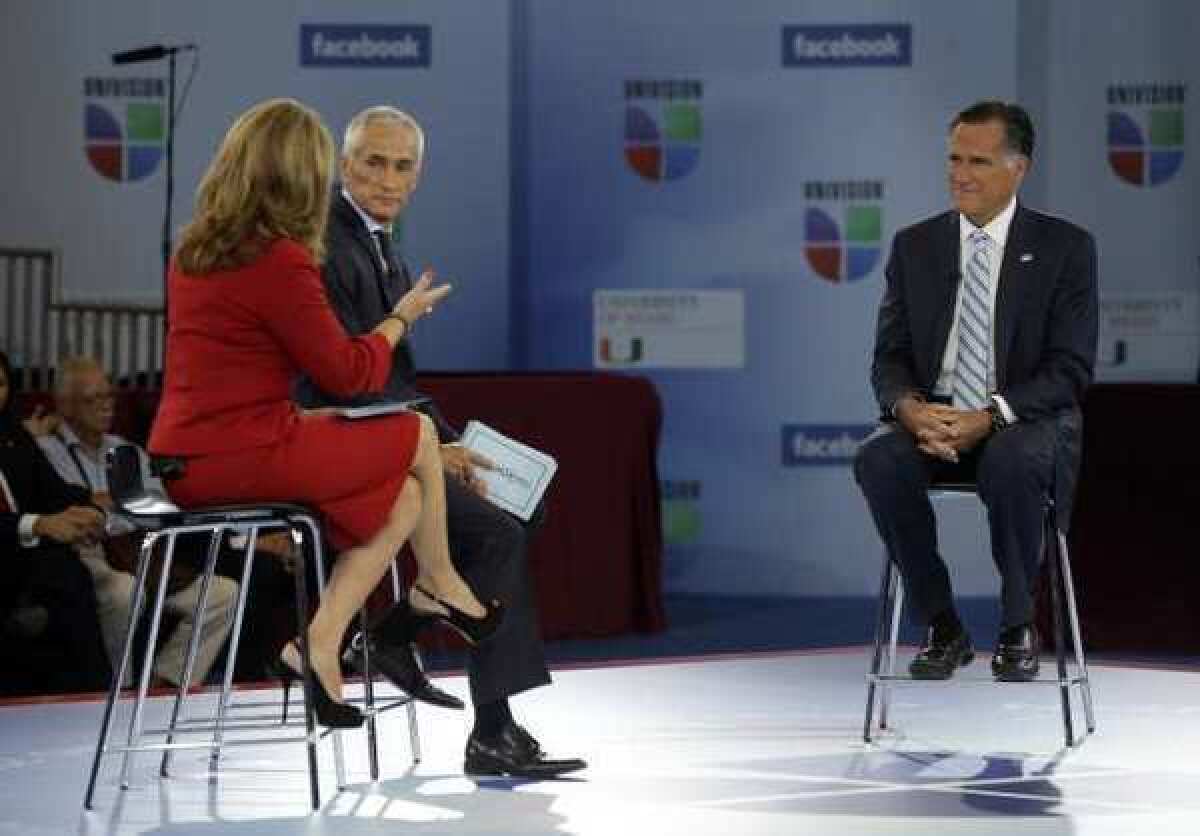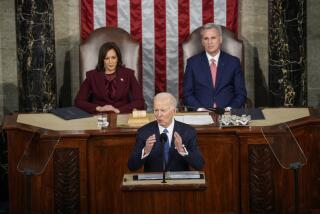Romney crosses the immigration divide

Polls show President Obama way ahead with Latinos, the nation’s fastest-growing voting bloc. According to the latest Gallup figures, he leads Mitt Romney by 66% to 26% among registered Latinos, who could be the voters who make the difference in November in four of the eight must-win battleground states: Colorado, Nevada, Florida and Virginia.
So did Romney help himself this week by giving a major speech to the Hispanic Chamber of Commerce in Los Angeles and participating in a forum on the Spanish-language Univision network? At both stops, he told voters he thinks immigration is good for America and promised that as president he would pass a “permanent” fix for the nation’s broken immigration system.
Most immigrant rights advocates and Latino activists dismissed his outreach as too little, too late — Romney can’t compete with Obama on immigration. Maybe, maybe not; we’ll find out in November. But that’s not the only measure of Romney’s speech.
COMMENTARY AND ANALYSIS: Obama vs. Romney
The Republican Party is divided on immigration and has been for decades. What’s changed in recent years is the fault line that separates the party’s immigration hawks from its immigration doves.
In 2006 and 2007, when Congress last considered comprehensive immigration reform, the critical question was: Are you for or against creating a pathway to citizenship for 11 million to 12 million unauthorized immigrants in the U.S.? In 2006, 23 Republican senators voted for that. Today, it would be hard to find two or three GOP senators prepared to endorse a path to citizenship — what most Republicans label “amnesty” — for the broad mass of unauthorized immigrants.
The question that divides the GOP today is even more fundamental: Are you for or against immigration, period? Republican immigration hawks believe American has admitted enough, or too many, immigrants and should be moving to restrict the flow. Those on the other side of the divide believe that immigration — legal immigration — is key to what makes the country great, economically and in other ways, including by renewing our spirit and revitalizing our communities.
PHOTOS: Joe Biden wants to hug ... everyone!
What’s significant about Romney’s appearances this week is that he came down firmly and passionately with the second group: in favor of expanded legal immigration and unequivocally repudiating the party’s restrictionist wing.
Not only that, but the speech comes at a pivotal moment, as both hawks and doves are girding up for a new, intensified fight.
For nearly a decade, restrictionist activists have had the upper hand in the Republican Party, blocking constructive steps in Congress and driving harsh enforcement measures in the states. Former Colorado Rep. Tom Tancredo spoke for many in 2007 when he was asked about guest-worker programs. “I’m not going to aid in any more immigration to this country,” he said.
INTERACTIVE: Battleground states
But today the hawks are on the defensive. The Supreme Court ruled against them in June, blocking most provisions of Arizona’s controversial 2010 immigrant policing law and all but shutting down stand-alone state immigration enforcement. Meanwhile, Republicans in Congress have surprised and frightened the restrictionists by introducing a raft of measures to fix the legal immigration system, proposing new or improved visas for agricultural workers, entrepreneurs and science and math students, among others.
On the other side of the divide, Republicans who understand the value of immigration — and the Latino vote — are stepping up. Jeb Bush, long a leading voice in favor of easier legal immigration, has been speaking out on the issue. Florida Sen. Marco Rubio, one of the party’s rising stars who gave one of the best speeches at the Tampa convention, developed a proposal this spring to grant work permits to young people brought to the country illegally as children, a proposal very similar to the one the president later adopted as his own.
Other influential party members known to favor a more generous immigration policy: former Mississippi Gov. Haley Barbour, tax activist Grover Norquist and Rupert Murdoch, who went public in April with strongly worded advice for Romney, urging him to repudiate the tough-sounding immigration rhetoric he’d been using in the primary campaign.
No one in the GOP can say it today — after all, Romney is the nominee — but many clearly feel he went too far in the heat of the primaries and are glad to see him clarifying his position now.
The truth is, most of what Romney said this week he has said before, many times. But now there can be no mistaking which side he’s on: still opposed to illegal immigration, still adamantly against “amnesty” and still in favor of tough immigration enforcement, but not — emphatically not — a restrictionist.
Just listen to the speech he gave to the Hispanic Chamber: “One million immigrants legally enter America every year, the largest number of any country in the world. And I like that. I want to preserve our heritage of robust legal immigration.... Immigration is essential to our economic growth and prosperity.”
Romney’s outreach to Latinos was an important step in the right direction for the GOP, but it was also more than that. Passing immigration reform — even piecemeal, incremental immigration reform — will be an uphill climb next year, no matter who is president. It will take both parties to fix the system and, over the long haul, to keep the door open to immigrants. Romney’s speech bolsters other Republicans who understand that the GOP has to be part of the solution, and it ought to be welcomed by all Americans who grasp just how essential it is that we go on attracting talent and vitality from around the globe.
Tamar Jacoby, a fellow at the New America Foundation, is president of ImmigrationWorks USA, a national federation of small-business owners working for better immigration law.
More to Read
A cure for the common opinion
Get thought-provoking perspectives with our weekly newsletter.
You may occasionally receive promotional content from the Los Angeles Times.






